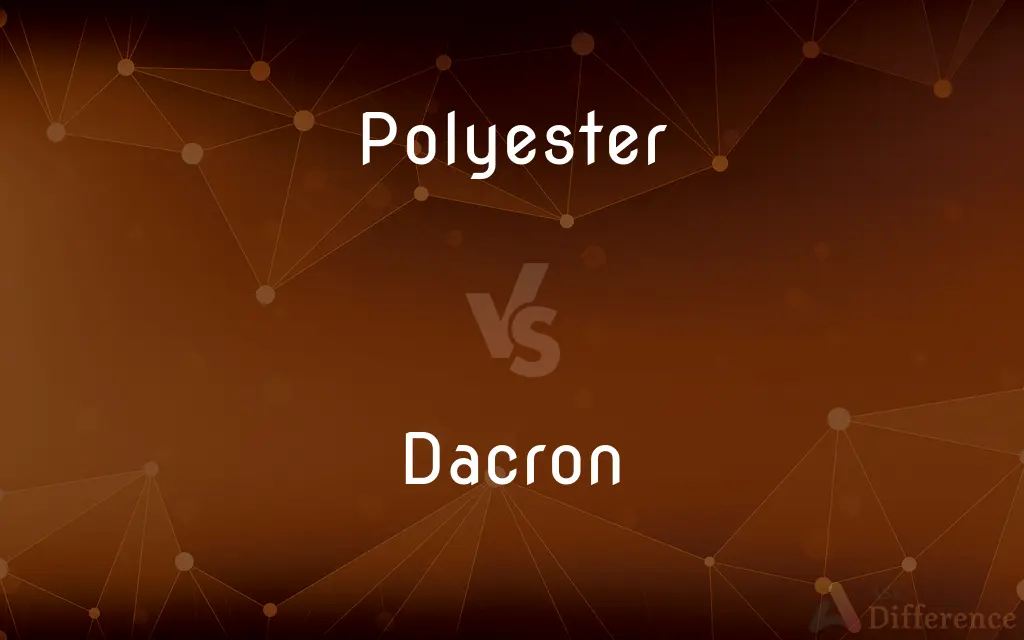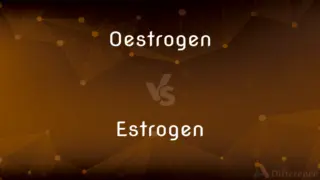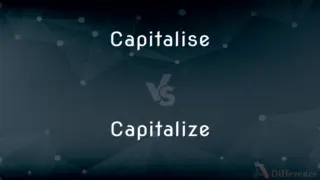Polyester vs. Dacron — What's the Difference?
By Tayyaba Rehman — Updated on November 6, 2023
Polyester is a category of polymers used in synthetic fibers; Dacron is a trademarked version of polyester fiber.

Difference Between Polyester and Dacron
Table of Contents
ADVERTISEMENT
Key Differences
Polyester is a synthetic fiber derived from petroleum-based substances, known for its durability and resistance to various chemicals. Dacron, a registered trademark, is essentially a type of polyester fiber that is branded and has specific characteristics defined by its manufacturer.
Polyester fibers are used widely in textiles for clothing, home furnishings, and industrial applications due to their versatile properties. Dacron, while it is polyester, is known particularly for its use in textiles that require high tensile strength, such as sails, tents, and various outdoor applications.
Polyester as a material can be blended with other fibers to create fabrics with mixed properties. Dacron, however, is often used in its pure form to take full advantage of its specific qualities like low absorbency and good thermal insulation.
Polyester is a broad term that includes a wide range of polyethylene terephthalate (PET) materials, while Dacron is a specific brand of PET manufactured by a company that might have a proprietary process, giving it a unique quality standard.
Polyester fabrics are praised for their wrinkle resistance, and the term itself has become synonymous with synthetic fabrics. Dacron, being a type of polyester, also shares these attributes but is often highlighted in contexts requiring material with a higher grade, such as in the production of high-quality bedding and fabrics.
ADVERTISEMENT
Comparison Chart
Category
A synthetic fiber made from polyethylene terephthalate (PET).
A brand name for a type of polyester fiber.
Usage
Used in a broad range of products from textiles to bottles.
Specifically known for textiles and high-strength applications.
Branding
Generic term for the material.
Trademarked brand name.
Properties
Can vary widely depending on the specific formulation.
Has specific characteristics defined by its manufacturer.
Market Presence
Ubiquitous and widely known as a common textile material.
Marketed for its quality and specific uses.
Compare with Definitions
Polyester
A category of polymers used to make synthetic fibers.
Her dress is made of a lightweight, breathable polyester.
Dacron
A trademarked polyester used in medical applications.
Surgeons use Dacron grafts for vascular surgeries.
Polyester
A durable and versatile textile material.
They chose polyester curtains for easy maintenance.
Dacron
A type of polyester known for its durability in textiles.
Dacron is preferred for outdoor furniture covers.
Polyester
A fabric resistant to shrinking and wrinkling.
This polyester blend retains its shape after washing.
Dacron
A brand name for a high-strength polyester fiber.
The sails are made from specially woven Dacron.
Polyester
A plastic made into fibers for clothing and containers.
The recycled polyester is used to create eco-friendly packaging.
Dacron
A specific form of polyester for quality textile products.
Their premium line of jackets is made of Dacron for enhanced performance.
Polyester
A synthetic fabric often used for outdoor gear.
His new hiking backpack is made from waterproof polyester.
Dacron
A fabric choice for non-absorbent and resilient materials.
The cushions are filled with Dacron for long-lasting comfort.
Polyester
Polyester is a category of polymers that contain the ester functional group in every repeat unit of their main chain. As a specific material, it most commonly refers to a type called polyethylene terephthalate (PET).
Dacron
A polymer, polyethylene terephthalate PET, as used for making thread and cloth.
Polyester
A synthetic resin in which the polymer units are linked by ester groups, used chiefly to make synthetic textile fibres.
Dacron
A brand of polyester textile fiber, or the wrinkle-resistant fabric prepared from it.
Polyester
Any of numerous synthetic polymers produced chiefly by reaction of dicarboxylic acids with dihydric alcohols and used primarily as light, strong, weather-resistant resins in boat hulls, textile fibers, adhesives, and molded parts.
Dacron
A kind of polyester fabric
Polyester
A wrinkle-resistant fabric of fibers made from any of these resins.
Polyester
Any polymer whose monomers are linked together by ester bonds
Polyester
A material or fabric made from polyester polymer
Polyester
Of, or consisting of polyesters
Polyester
Any of numerous synthetic resins; they are light and strong and weather resistant
Polyester
A complex ester used for making fibers or resins or plastics or as a plasticizer
Polyester
Any of a large class of synthetic fabrics
Common Curiosities
Are polyester fabrics breathable?
Polyester's breathability depends on the weave and treatment of the fabric.
Is Dacron hypoallergenic?
Dacron is considered hypoallergenic.
Is all Dacron polyester?
Yes, Dacron is a type of polyester.
Is Dacron suitable for outdoor use?
Yes, Dacron's durability makes it suitable for outdoor applications.
Can polyester be recycled?
Yes, polyester can be recycled.
Does polyester shrink?
Polyester is generally resistant to shrinking.
Does Dacron pill like other polyesters?
Dacron is resistant to pilling due to its strong fibers.
Can Dacron be ironed?
Dacron can be ironed on a low setting if necessary.
Are polyester clothes comfortable?
Comfort depends on the fabric blend and construction.
What differentiates Dacron from other polyester brands?
Dacron has specific quality standards and uses set by its manufacturer.
Is polyester water-resistant?
Polyester is inherently water-resistant, but not waterproof.
What are common uses for Dacron?
Dacron is commonly used in sails, outdoor fabrics, and medical devices.
Why is Dacron used for vascular grafts?
Its durability and non-reactive properties make it suitable for medical use.
Do polyester fabrics breathe as well as natural fibers?
Not usually, but fabric technology has improved polyester's breathability.
Is polyester good for the environment?
Polyester's environmental impact is debated; recycling efforts aim to reduce it.
Share Your Discovery

Previous Comparison
Czech vs. Slovak
Next Comparison
Abstract vs. SummaryAuthor Spotlight
Written by
Tayyaba RehmanTayyaba Rehman is a distinguished writer, currently serving as a primary contributor to askdifference.com. As a researcher in semantics and etymology, Tayyaba's passion for the complexity of languages and their distinctions has found a perfect home on the platform. Tayyaba delves into the intricacies of language, distinguishing between commonly confused words and phrases, thereby providing clarity for readers worldwide.















































